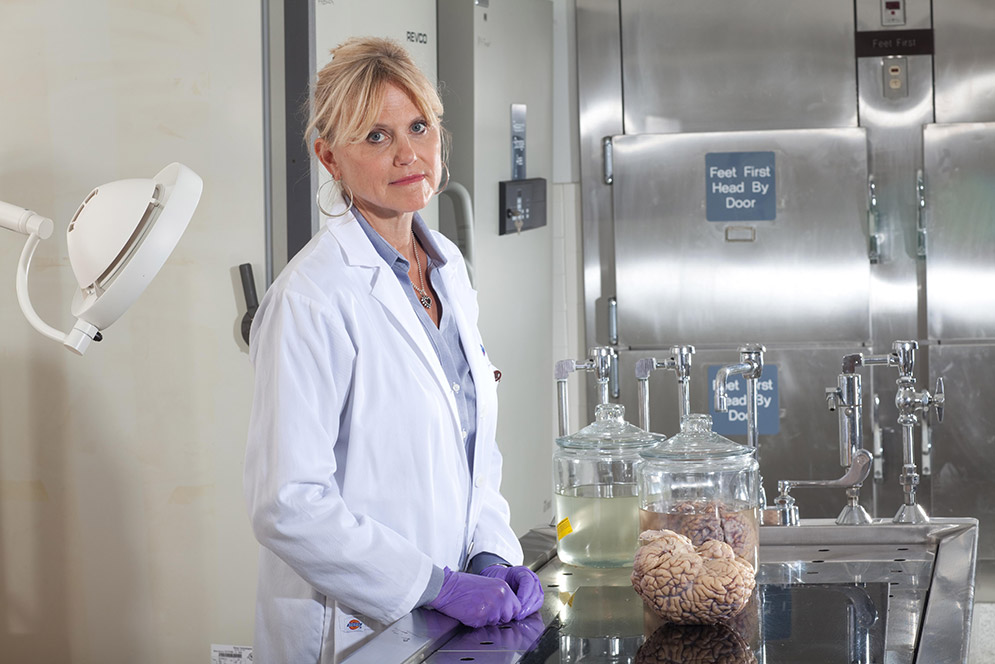Ann McKee Elected to the National Academy of Medicine
BU neurologist studying concussions in athletes and soldiers

Photo by Asia Kepka
The National Academy of Medicine (NAM) is made up of more than 2,000 international members, elected by their peers, for outstanding achievements in medicine. Ann McKee, a School of Medicine professor of neurology and pathology, director of the Chronic Traumatic Encephalopathy Center, and chief of neuropathology at the Boston VA Healthcare System, has been elected in recognition of the huge impact that her research on brain injuries in football players and military servicepeople has had on public health.
BU Today: Your work on concussions has been nothing short of groundbreaking. Can you recall the moment when you realized this was a defining issue that you wanted to pour your research into?
McKee: I had become very interested in the deterioration found in boxers’ brains, and when I saw the brain of John Grimsley, a 45-year-old football player in 2008, I was stunned to see the same pattern of pathology that I found in the boxers. I knew immediately that this was very important. I was a lifelong football fan; I knew that football players damaged their knees and hips, but it was a shock to find that they were damaging their brains as well. And with each additional case that came into the lab, the evidence grew stronger and the importance of the findings to public health became more evident.
We hear so much talk about head trauma from football. Can you talk about how prevalent head trauma is in the military and why that became a second focus of your work?
I’ve worked at the Veterans Affairs (VA) hospital for 25 years. Over 360,000 military service members were exposed to traumatic brain injury from blast and impact injury in the Iraq and Afghanistan conflicts. Although there are similarities between blast injury and athletic injury, we know far less about military-related injuries. We are hoping to raise the number of brain donations from veterans in order to solve this knowledge gap.
I read that you love to paint. Does art help your work in medicine in any way?
Medicine is an observational science, and being a visual person, with a strong visual memory, tends to increase your powers of observation. I also think that creativity, which is a central component of painting and visual arts, is absolutely essential to science.
If you were to look ahead one generation, say in 20 years, do you think football, as we know it today, will be the same game, with the same popularity?
The risk of CTE is directly related to the cumulative exposure to subconcussive hits. If football rules do not change, if players continue to experience hundreds of subconcussive hits per season, and if nothing is done to better detect and treat early brain injury, then I think that the future of football will parallel the trajectory of boxing. It will become less popular in mainstream America, less common in institutions of higher learning, and the province of the disadvantaged.
What would you tell a young mother today with a 10-year-old begging to play football? And what might you tell the child?
I would encourage the mother and son to play another sport with less head contact. The truth is inconvenient and unwelcome, but football damages brains, and young brains especially.
You have faced a lot of criticism with your findings. But I read that your nieces refer to you as “Auntie Badass.” Where did that come from?
In this case, it is a term of endearment. My nieces are proud of me, not just because I had the right cognitive skills at the right time, but because I’ve had to face dismissiveness and sexism, people trying to claim credit for my work, and people and organizations trying to derail me. I’ve had to fight for where I am with persistence and determination and my eyes focused straight ahead.
You’ve received so many honors and accolades; can you put this one from the National Academy of Medicine in perspective for us?
It is recognition of professional achievement and commitment to service; I am very honored to be recognized for my work to improve public health.
Comments & Discussion
Boston University moderates comments to facilitate an informed, substantive, civil conversation. Abusive, profane, self-promotional, misleading, incoherent or off-topic comments will be rejected. Moderators are staffed during regular business hours (EST) and can only accept comments written in English. Statistics or facts must include a citation or a link to the citation.